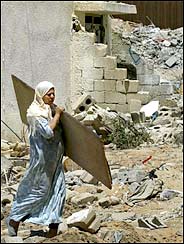|
|
Israeli Official Offers Empathy but Hits a Nerve
By James Bennet, The New York Times
May 24, 2004

Israel's justice minister, a Holocaust survivor, started a political uproar on Sunday when he attacked an Israeli plan to demolish Palestinian homes in Gaza and said that a suffering Palestinian woman reminded him of his grandmother.
The minister, Yosef Lapid, said he was not comparing the Israeli Army to the Nazis in his comments, made during a cabinet meeting.
But, he told Israel radio after the meeting, "I did think, when I saw a picture on the TV of an old woman on all fours in the ruins of her home looking under some floor tiles for her medicines - I did think, 'What would I say if it were my grandmother?' "
Mr. Lapid, who was born in a Hungarian-speaking part of Yugoslavia, lost relatives in the Holocaust, including his father and a grandmother.
His remarks fed an Israeli debate about a continuing Israeli military campaign, now in its sixth day, in the Palestinian neighborhoods of the southern Gaza Strip. At least 40 Palestinians have been killed during the raid, and Palestinians say Israeli armored bulldozers and tanks have destroyed more than 30 homes.
Another cabinet minister, Danny Naveh, who also lost relatives in the Holocaust, rejected any comparison to the Holocaust, even implied.
"Any analogy, even hinted at and - I am convinced from my acquaintance with Mr. Lapid - unintentional, creates greater anger and has no place in any form," he said.
In the radio interview, Mr. Lapid said the army was considering demolishing as many as 2,000 Palestinian homes in the Rafah refugee camp to expand an Israeli-patrolled zone along the Egyptian border.
"We look like monsters in the eyes of the world," said Mr. Lapid, a combative television personality who is now the leader of the centrist Shinui party, which is part of the governing coalition. "This makes me sick."
During more than three years of conflict, the army has already demolished many homes in that area, expanding the Israeli-controlled zone as it combats weapons smugglers who tunnel under the Israeli soldiers to Egypt. The wider the patrol zone, the army says, the harder it will be for smugglers to dig tunnels.
Israeli officials previously spoke of demolishing up to hundreds more homes, prompting an international outcry and criticism from the Bush administration. Officials say the army is considering compensating Palestinians whose homes it destroys.
The army said that during the current operation it had demolished only a few homes in Rafah, in response to shooting by militants. It also said that it had suffered no casualties and that it had found one tunnel, and possibly a shaft to a second one.
The army has reduced its presence in Rafah in the last two days, though some bulldozers and tanks were seen Sunday in the Brazil neighborhood. Early Monday, military officials said troops had withdrawn from the Tel al-Sultan neighborhood, Reuters reported.
In the West Bank city of Nablus on Sunday, three members of the militant group Hamas were killed, apparently when explosives that they were handling blew up.
The United Nations agency for Palestinian refugees said that early Thursday, during an Israeli raid on the West Bank city of Jenin, Israeli forces broke into the agency's office near the refugee camp there. It said soldiers fired a shot toward the agency's senior project manager, then handcuffed and blindfolded him and held him for three hours, threatening him with violence.
The manager, Paul Wolstenholme, was released unharmed, and Israeli military officials later apologized, the agency said.
In November 2002, in the same United Nations compound, a soldier shot and killed Iain Hook, Mr. Wolstenholme's predecessor in Jenin, during a skirmish with militants.
|

|
|



